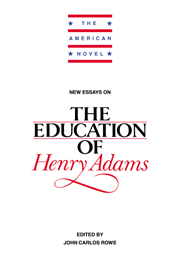Book contents
- Frontmatter
- Contents
- Series Editor's Preface
- 1 Introduction
- 2 The Education of an American Classic: The Survival of Failure
- 3 Being a “Begonia” in a Man's World
- 4 Henry Adams's Education in the Age of Imperialism
- 5 The Education and the Salvation of History
- Notes on Contributors
- Selected Bibliography
- Index
2 - The Education of an American Classic: The Survival of Failure
Published online by Cambridge University Press: 15 December 2009
- Frontmatter
- Contents
- Series Editor's Preface
- 1 Introduction
- 2 The Education of an American Classic: The Survival of Failure
- 3 Being a “Begonia” in a Man's World
- 4 Henry Adams's Education in the Age of Imperialism
- 5 The Education and the Salvation of History
- Notes on Contributors
- Selected Bibliography
- Index
Summary
Aimed to “encourage participants to think for themselves about questions of enduring human significance,” the Great Books Foundation includes The Education of Henry Adams in its fifth series of reading and discussion. This honor would have surprised one of the most successful editors of a collection of “great books” in the United States, Harvard President Charles W. Eliot. The fifty volumes of Eliot's The Harvard Classics began publication in 1909. Two years earlier, Adams had privately circulated The Education to a highly select circle, including Eliot, Theodore Roosevelt, and Henry and William James. Eliot's response, Adams confided to Roosevelt, was the one he feared above all others. “Eliot's sentence will be damnation forever.” Eliot did not even provide a sentence of blame. He returned his copy without a word. Later he was reported to comment, “An overrated man and a much overrated book.”
Eliot's response, however, has not consigned The Education to literary hell, even though Adams himself often seems to share his judgment by continually calling attention to the book's failure. Comparing his effort to St. Augustine's and Rousseau's, Adams wrote to Barrett Wendell, “I feel certain that their faults, as literary artists, are worse than mine. We have all three undertaken to do what cannot be successfully done – mix narrative and didactic purpose and style. The harm of the effort is not in winning the game but in playing it. We all enjoy the failure” (E 514).
- Type
- Chapter
- Information
- New Essays on The Education of Henry Adams , pp. 23 - 48Publisher: Cambridge University PressPrint publication year: 1996

